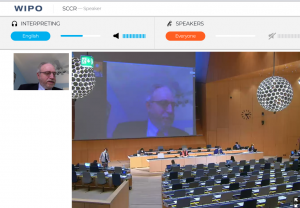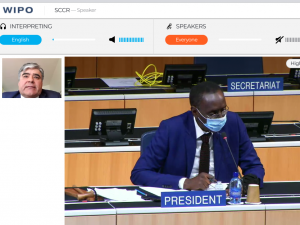November 18, 2020
Among NGOs attending the SCCR 40, there are clear opposite views of what should be done by the SCCR right now. The rightholders (collective societies and producers) say things are fine, they just need more licensing opportunities. The not-profit organizations representing libraries, museums, archives, educations and researchers make concrete proposals regarding what can and need to be done for improving access and preservation of knowledge, information, data and cultural heritage.
Here are notes from both sides.
The European Visual Artists (EVA) described the pandemic as a great opportunity for licensing and is opposed to any limitation and exceptions as well as safe harbour for any entity.
EVA is representing collecting societies for visual artists in Europe. Members believe collective licensing has a huge role to play for the benefit of artists, cultural heritage institutions, educational institutions, and all the users.
We see from the pandemic and its involvement there that it is a showcase for how quickly licenses can be developed and meet the use, or the needs of this increased demands. To meet the needs and demands expressed by cultural heritage institutions and educational institutions in a balanced way, in our view, exceptions and limitations, new exceptions and limitations should be prevented because copyright is important and is essential for these authors to make their daily lives and therefore it should not be reduced.
Our collective management organizations for visual works issues thousands of licenses nearly daily and so they facilitate both access to content and legal certainty. Licenses are concluded not only with cultural heritage institutions and educational institutions, but expressively also with museums where they are covering all usage and solving matters of cross-border use, for instance.
Collective licensing is provided for out-of-commerce works in public collections, and we believe that is a great way to solve many difficulties in a way that is good for all sides.
We believe also that sufficient options are already available on national and regional levels, and no binding instrument on the international level is needed.
I would also like to say that I believe safe harbors are not should also be prevented because actually these are limitations in disguise, so we would not appreciate that.
CHAIR: A binding international instrument is not necessary you said, and you stressed the need for norms for licensing and there is a need for speed with regards to cross-border regulation.
International Federation of Film Producers Association also 100% for more and more licensing $ as a solution to access:
FIAPF: We submit that the existing international copyright framework, including the Berne Convention, the WCT and TRIPS already provides the required flexibilities to allow Member States to introduce exceptions and limitations that address specific issues relevant to their national laws and cultural priorities and in compliance with the three-step test. We also underline that such exceptions and limitations should only be introduced after thorough impact assessments in order to ensure local creative industries are not damaged as a result.
…
Libraries and archives has historically played an important part in promoting and discovering availability and access to film and other cultural heritage. Our industry has a long tradition of working collaboratively with these institutions. We believe the answers to preservation and accessibility activities do not lie in international norm setting on exceptions and limitations. It is licensing that makes sufficient resources, funding in particular and skills, including legal skills available to these important public institutions so they may continue to be agents of cultural life in cooperation with us, the rightsholders.
ELAPI is against existing flexibilities “as it would be the end to law”:
Latin American School of Intellectual Property: Limitations and exceptions should be act of sovereignty of each state. They respond to exceptional legal situations, and countries should regulate these exceptions in a specific way, not through a treaty. To think that these situations that are special and exceptional should be dealt with by an international treaty would generate great legal insecurity and lead to a great deterioration of conditions whereby authors can make a living and improve our lives with their creations.
Because all of this directly affects the GDP of countries and the knowledge economy which generates jobs and helps the growth of economies, so there should not be exceptions and limitations in all situations. So much flexibility in the law leads to insecurity in the law and restricts the possibilities of authors to make a living from their creations. Consequently, ELAPI urges the countries of GRULAC not to make exceptions a norm because that would be an end to law. We are, therefore, convinced that it is neither necessary nor relevant to think about a treaty on exceptions and limitations. We are prepared to collaborate with GRULAC and the region, since we have ways of bridging this gap.
IFRRO, not surprisingly since it is a collective management organization is supporting more licensing:
IFRRO is network for collective management organizations or CMOs and author and publisher organizations in text and image sector. We are pleased to see the central role played by CMOs to facilitate access to work, including across borders, is reflected in the report from the Secretariat.
CMOs enable cross-border licensing, making it possible for students to access learning materials regardless of where, and indeed during the COVID-19 pandemic, CMOs have adapted the licensing skills to enter the teaching activities can continue. The regional seminars and conference so ably organized by the Secretariat last year enabled a thorough discussion of exceptions and limitations.
Our view, based on the discussions reflected in the report of those meetings is that the answer to the access challenges being experienced is a combination of more effective implementation of already-existing international copyright instruments and capacity building.
Consequently, IFRRO favors an outcome from the SCCR discussions on exceptions and limitations which focuses on, first, the exchange of information in practice; second, the offering of a demand driven WIPO technical assistance program to which we will be pleased to contribute; third, government cooperation.
CCI, the Canadian copyright Institute is claiming that “creative industries have come to to the rescue during the crisis”:
CCI: Thank you very much, Mr. President for the opportunity. The author’s creators, publishers, and distributers that participate in the work of the Canadian Copyright Institute respectfully note that any discretion of copyright that is based on human rights in the public sector should support robust copyright protection. Copyright is a human right and strong copyright protections function in the public interest.
Individual cultural professionals and independent cultural industries, particularly small and medium-sized enterprises are essential to the practice and preservation of the rich and diverse cultures that thrive locally, nationally, and regionally around the world. They’re essential to education, scholarship, and local economies. Freedom of expression suffers when they suffer. As conveyed by the report on the International Conference on Exceptions and limitations and the general principles and ideas, exceptions and limitations should not be the only lens through which SCCR views copyright. To quote the report, copyright should not be seen as an obstacle but as a facilitator.
We respectfully recommend that all Member States ensure their national copyright laws, protect the exclusive rights necessary to sustain their creative sectors rather than approaching the matter as a question of which rights to extinguish.
In particular, during the COVID-19 crisis, exceptions and limitations must be viewed with great caution. In the early days of the pandemic, creative industries and professionals strang voluntarily to the assistance of educators and others that rely on copyright-protected works. They had the capacity to do so because their copyrights are protected. This crisis confirms the importance of a strong creative sector supported by copyright protections.
After these long and painful industry statements pushing for more licensing while most people are hoping for some good work on limitations and exceptions to copyright allowing access to education, knowledge and information and preservation of cultures, the Chair called on the civil society organizations that have been working on these agenda item for years. Here are some of the most interesting ones with proposal for concrete actions that the committee should engage in right now.
Program on Information Justice and Intellectual Property
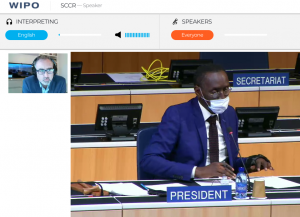
PIJIP: We would like to start out by agreeing with the statements of the many delegations that the way forward on this agenda item must take into account the current pandemic. Many exceptions for education, research, and access to the collections of cultural heritage institutions contain narrow criteria that could impede online and distance activities that are necessary during COVID. For instance, laws commonly permit only reproduction for these interests but fail to authorize communication needed for the sharing and control of networks. Uses are often restricted to face-to-face classroom, or on-premises uses. We have even found laws that specifically restrict uses to paper. Strict interpretations of such laws during COVID violates fundamental rights, includes the right to seek, receive, and impart information through any media and regardless of frontiers, and that’s a direct quote from Article 19 of the universal Declaration of Human Rights.
This Committee could use the DOHA declaration on TRIPS and Public Health as a model and draft a resolution that explains and promotes the current flexibilities in the international system that can be used to respond to COVID. We thank the Secretariat for the very thorough report on the action plans, and Paragraph 400 of the Report records the agreement to work on solutions, including instruments at appropriate levels.
We find the Report contains a large amounted of agreement on the priorities that this work should include, including work towards instruments in whatever form on preservation, digital, and cross-border uses for education, research, libraries, archive, and museum and creation of model laws and other issues such as safeguards for reliability, measures and contractual override. The work plan would also benefit from new studies and areas that haven’t been covered yet, for instance, there is no study specifically on research exceptions and also this is an opportune time on measures taken to improve access to the core issues during COVID. As always we’re pleased to provide assistance and research on any of these issues of interest to the Committee. Thank you.
ICA the International Council on Archives
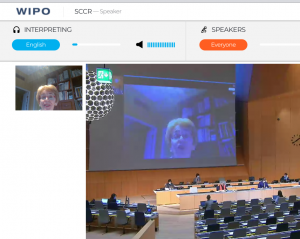
…While no normative work will occur, SCCR 40 provides an opportunity to advance this agenda by considering concrete next steps. WIPO’s mandate is to develop a balanced and effective international IP System without an international system that sets out minimum for libraries, archives, and museums and there is a big gap in the system. We do not need more studies or sharing of national experiences. We already know that exceptions and national copyright laws vary widely. If WIPO does not act, the gap will be filled by ever more divergent national practices.
I also wish to note that while licensing and contracts are a legitimate part of the broader copyright system, they are not relevant to a discussion of limitations and exceptions. The report gives clear direction for action in the areas of preservation and cross-border digital access. COVID-19 leaves no doubt about the importance of cross-border digital access to our global cultural heritage as the pandemic closed libraries and archives and museums around the world. The pandemic has taught us that global and digital are indisputably watch words for the long term.
Thus, we urge the SCCR to identify concrete next steps to prioritize normative work on exceptions in these areas. Only through text-based work will the points of disagreement emerge, followed by discussion and negotiations that will ultimately lead to a constructive consensus.
We suggest that the Secretariat be asked to prepare a draft model law that addresses preservation and digital cross-border uses by libraries and archives, museums, for discussion at SCCR 41. Thank you, Chair.
CHAIR: Thank you very much. We noted WIPO must take action in order to prevent the deepening of the gap. It’s action could take on the form of a proposal of a law. IAF, please, and then we will have EIFL. IAF and then EIFL.
EIFL Electronic Information for Libraries
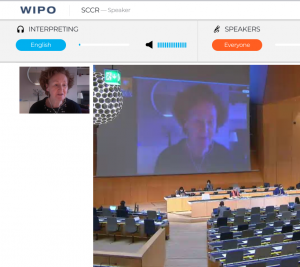
EIFL: I’m speaking on behalf of Electronic Information for Libraries and first we express our appreciation to the Secretariat for hard work in compiling a report that provides a excellent summary of the four events held last year.
In the takeaway considerations, we welcome the recognition of cultural heritage as an invaluable and vulnerable common good. At all the events, a high degree of consensus was expressed for work on preservation of cultural heritage. Experts, delegates, and observers alike recognized the threat posed by natural disasters, fire, and floods to the cultural heritage of many Member States, particularly island nations affected by climate change.
Further, they agreed that the copyright laws in many countries, especially in the developing world, do not have adequate exceptions for digital preservation or cross-border uses.
Chair, the COVID-19 pandemic illustrates the preservation problem. Right now, librarians are working to identify and preserve information on COVID such as research data, scientific articles, public health videos, social media, and news reports.
These curated COVID-19 collections are vital for future scholarship and science in order to study and draw lessons from the public health, economic, and cultural impact of the biggest global health crisis of our times.
However, if the works are not professionally preserved, they won’t exist or they won’t be findable. In countries without clear preservation rights, they will be left behind with gaps in the national record or works preserved and held in institutions and other countries with better laws.
Licensing is not a solution for preservation, and I’m afraid that the best legal skills in the world won’t fix a bad copyright law.
So, SCCR should adopt a work plan including text-based work on a preservation instrument in line with the 2012 mandate. While the work of the Committee is curtailed due to the pandemic, it shouldn’t come to a stop during this time, so we suggest a practical interim approach that the Secretariat should retain its expert, professor Kenneth Crews to prepare a intervention, and this could easily be ready by the next SCCR at which point it would provide countries with helpful guidance on this important topic.
Finally, until the pandemic is clearly in the rear view mirror, we would also suggest that the Committee examine the impact on access to copyright protected content as a result of the pandemic.
CHAIR: Thank you. Thank you very much. You talked about the importance of preserving heritage, and you also talked about the lack of protection in this context. You also made a proposal for an interim approach, one of a practical nature, and you are also proposing that WIPO tries to assessment impact of COVID-19 in the current context.
KEI
KEI: Thank you, Mr. Chairman. KEI thanks the Secretariat for the clear and useful report on the meetings on limitations and exceptions and the Chair for his very able leadership.
Limitations and exceptions are important for individuals and society, particularly with regards to education and research, which are key to development and economic growth as well as social issues, for example, exchanging information and views.
None of the groups have acknowledged an important fact that they depend upon limitations and exceptions to create works. As mentioned by some delegates and some NGOs, the current pandemic has disrupted education and in some cases, closed schools and libraries. The global norms for patent laws include provisions for extra flexibility with regards to inventions in cases of emergencies.
WIPO should share information, considers soft or hard norms to make it clear that controlled digital lending by libraries and schools during a pandemic are appropriate.
Also, SCCR should address two areas for global norms for limitations and exceptions in the current work program. First, there is an opportunity for an instrument on preservation and archiving. Preservation is an urgent global public good and many national laws are inadequate.
Last, with regard to other disabilities, we propose that the SCCR use the language in Article 15, paragraph B of SCCR 18/5 as a basis for joint resolution to extend the benefits of the Marrakesh Treaty to persons with other disabilities who due to their disabilities need an accessible format of a type that could be made which would allow them access to the same degree as a person without a disability and this would be consistent with the UN Convention on the rights of persons with disabilities. Thank you
The international council of museums
ICOM: …The international council of museums represent global museum in more than 138 countries. Museums as non-profit institutions are key actors at the service of society through the safeguarding and protection of heritage, the promotion of cultural diversity, and lifelong learning and transmission of knowledge.
However, the achievement of this objective is threatened by climate change, lack of resources, and conflict, theft, and other risk which can lead to the loss of invaluable and vulnerable collections.
ICOM would like to thank WIPO Member States and the Secretariat which have made it possible to the valuable studies, reports, and meetings to underline that while there is a broad recognition about the importance of preserving museum collections, there are a number of factors which prevent museums to do so. These include the lack of specifically adapted legislative provisions, including exceptions for preservation and often works are cross-border issues, and this legislation and lack of common framework and perform legal uncertainty.
Chair, museums need now more than ever an adapted and harmonized copyright system allowing for limitation and exception for preservation purposes to be put in place to ensure the survival of our common memory, history, and heritage.
The proposals identified in the report, particularly with regard to licensing cannot meet this need and allow a museum to exist in a digital environment, especially in light of the serious repercussions of COVID-19. Indeed, certain 30% of world’s museums risk never reopening doors with collections and implementation that cannot cross-border internar. The need for concerted international action is more pressing. In light of this, ICOM urges SCCR as global facilitator and accelerator to make meaningful and effective steps.
A first response could be the establishment by the Secretariat, along with the relevant stakeholders of model law provisions on preservation and access before moving on to text-based normative work on limitations and exceptions that provide a institution that preserve a common heritage around the world with harmonized adaptive and effective legal framework essential to the fulfillment of the mission, which WIPO’s action to support the libraries and archives and mission to preserve common heritage. Thank you.
Canadian Federation of Library Associations
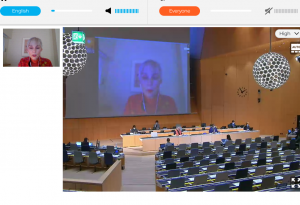
…on behalf of the Canadian Federation of Library Associations. CFLA represents libraries of all types, public, academic, specialized, and school libraries, prevention, regional, national library associations, and libraries located in cultural and memory institutions. Libraries, archives, and museums continue to experience barriers to access and preservation that are not addressed by approaches that focus on licensing, and our situation has been made even more acute by the COVID-19 pandemic.
After decades of effort by libraries, licensing has failed to create a digital environment that provides a level of access and preservation that print offered. We support continued work related to preservation and recommend a report on a possible instrument or model law for preservation exceptions for libraries, archives, and museums.
There is broad agreement among the Member States for continued work on limitations and exceptions for libraries, archives, and museums and that preservation is an important issue to address so that cultural and historical records are preserved.
CFLA supports work on an international instrument or model law on preservation that can be a catalyst to advance international considerations.
Limitations and exceptions for libraries, archives, and museums are part of the balance in copyright. We encourage SCCR to make progress on limitations and exceptions and to move forward on productive outcomes from the numerous studies, Dr. Crews’ typology and learnings from discussions and meetings in the last year.
CFLA asks that the SCCR prioritize instrument or model law on preservation or cross-border uses for libraries, archives, and museums.
Center for Internet in India
CIS …Speaking on behalf of the Center for Internet in India. As some of you may be aware last month, India, South Africa, and Kenya shared a proposal at the World Trade Organization to remove IP barriers in order to improve access in development of medical products to address COVID-19.
In the same spirit, it is brought to note the state of copyright barriers embedded in the draft treaties and issues before us in this forum.
To proportionately respond in a time of emergency, the impact of virtual persists for a while, especially on education and research, it is necessary to expand limitations and exceptions, and with respect to this agenda, I would urge the Committee to re-examine the scope of proposed work and expand it in order to build instruments and preservation digital and cross-border uses, create model laws and provisions on other issues, and simultaneously commission studies to identify and highlight measures and practices to build access to works during COVID-19. Thank you.
IFLA
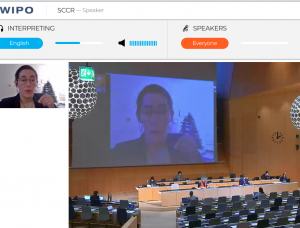
…IFLA thanks the Secretariat for its work on the report which provided evidence of consensus among delegates, and in particular around the need to for heritage preservation and access. Now, therefore is a time for action. Because of the lack of clarity in existing international law, leads to not only inadequate copyright laws but uncertainty for institutions when trying to work with digital tools or across borders to ensure the survival and availability of heritage.
Mr. Chair, in the context of a global pandemic that we are currently facing, we have seen the cost of leaving things up to
chance. Rightholder good will is, of course, welcome, but it should not be the case that required material depends on it. It requires more than ever the need to adopted, adapt are, or interpret laws to libraries, archives, museums, educators, and researchers to function in a digital environment.Yet, COVID is not the only crisis we face. This Committee has a potential to facilitate efforts to preserve heritage threatened by climate change, and clearly in the medium term, we believe that text-based work is essential.
In the short term, by the next meeting, known experts such as Professor Crews could be asked to prepare provision on preservation and access for discussion by members. This already would help. This Committee can offer valuable guidance to members about the interpretation of current international law at the time of COVID-19. Mr. Chair, rather than being left aside behind as individual countries or groups race ahead, we have confidence that WIPO can continue to show its relevance to ensure that as far as possible, the health crisis and the climate crisis do not become an education and research hereditiage crisis.
COMMUNIA has the floor.
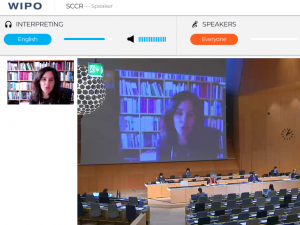
COMMUNIA: Thank you, Mr. Chair. This Committee has been discussing the issue of copyright exceptions for almost 15 years. During this time, a number of studies were conducted and we learned that many countries felt they weren’t allowed to use protected content for education research and other legitimate purposes. Still reaching a common ground for exceptions is not — is not a priority for all. Progress was limited, even though we were seeing a clear trend towards cross-border uses taking place online.
Now, that state of affairs can be acceptable before the massive disruption to society caused by the COVID-19 pandemic, but over the last six months, those cross-border and online uses have become the new normal. All over the world, institutions are opting for remote formats or hybrid models of in-person and online access and use of content. We may never go back to the way things were, namely, for education where we now have teachers and students working from home often located in different Member States and having to deal with the fragmented treatment of exceptions across those locations.
We understand that not all the countries prefer to negotiate bilaterally with developing countries. In our opinion, this perpetuates an inbalanced power relationship between the global north and the Global South. This Forum can provide more transparency and legitimacy to these discussions and we urge you to not leave the mandate unfulfilled.
In the Report from the Secretariat we can find something for everyone’s taste. Now it’s up to this Committee to set priorities for its work. We heard the Committee to spopped to the pandemic with declaration or resolution to assert the flexibilities that exist, and then work on model laws and on a binding solution for cross-border uses, and eventually discuss a minimum set of mandatory exceptions. Thank you.
CHAIR: Thank you. You have explained that COVID-19 has highlighted the problem of cross-border use, and it has continued to emphasize the disparities between north and south, and you called for a model law that would be binding.
CONECTOR
Thank you, Chairman. We’re a Civil Society organization in Columbia bringing together librarians and archivists. We need coordination work in an international area such as this Committee. We are implementing and hope for international instrument or model law. Libraries are part of markets, they shouldn’t be seen as a threat in any case, and in fact, libraries create new readers, and in other words they broaden markets so that libraries, archives, and museums can do their work, we need more flexibilities as with regards to access and preservation in particular, which will help us to meet global challenges such as the pandemic or global warming.
Education International
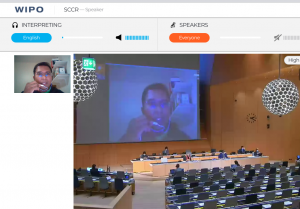
I speak on behalf of Education International, the global federation of education trade unions with about 384 organizations in 178 countries and territories. We represent the teachers, researchers, and education support personal worldwide. …It is my honor to share words of teachers, researchers, and education support personnel with you today as we find ourselves in a very challenging circumstances due to the global health crisis caused by COVID-19. The pandemic has led to historic disruption of educational research, shifting almost overnight from face-to-face.
teaching to distance teaching and research, including through radio, mobile phones, and various Internet platforms. Teachers around the world have been going above and beyond to ensure continuity of education and research activities, and as they did ever more so from being denied access to essential digital materials, being forced to work in legal gray zones of using — for using essential works at the risk of being prosecuted while fulfilling their public and human rights’ missions.More,teachers than ever experience that what is lawful in classrooms such as reading stories to children, playing songs in music classes or working with art is unlawful in an online environment, and in addition an increasing number of teachers and researchers experienced what the lack of clarity of cross-border uses of copyright works means as they teach courses for students located in different countries.
We want to stress again what should be uncontroversial; namely, that fair access to essential materials for teaching and learning are a key part of the right to education and knowledge and should never depend on the good will of private actors and market trends, not during the pandemic or in any normal times.
We could already observe now how including for e-books were already increasing, the prices, during the pandemic time, which is again shows why it’s so important to have a balance government-led copyright law that protects education as a public good and human right. The pandemic has shed further light on the injustice and once more shown the challenges discussed in the SCCR are real and need to be urge enterally addressed.
We thank the Secretariat for the thorough report and hope for the promised result-oriented approach including the consideration of an international legal instrument that was mentioned again by Member States today who understand the importance of an international commitment to address international challenges, as well as to promote national-level reforms.
In addition, in the short term also given, the global health crisis that we are facing right now, it will be essential for the SCCR and WIPO as a UN agency to provide guidance to Member States to navigate through the challenges here and now, and we hope that similar to other UN agencies, WIPO will be able to provide urge enterally needed guidance in the form of declaration or resolution in relation the to the exceptions and limitations in times of COVID-19 as well as commission studies that investigate copyright emergency measures to address the COVID-19 pandemic for education, research, and persons with other disabilities. I thank you, Chair.
The Society of American Archivists
SAA: The society of American archivists and North America’s largest organization of professional archivists thanks Member State delegates and commends the Chair on beginning a new role for the Committee. We look forward to the continued attention of the Committee in balancing copyright through exceptions and limitations, and we would like to find a way to help identify the next steps for SCCR’s work on archives, libraries, and museums.
Many of you are already familiar with what archives do and why we need exceptions to carry out our essential missions. For those of you new to the topic, let me explain. Archives exist in all kinds of institutions and contain all information formats. Our holdings are predominantly unpublished, never in commerce works and because they’re unique in the world, they are global heritage resources that are needed across borders. Archivists must identify, acquire, and preserve this material so it will last forever. Most importantly, we work to assist researchers using our material. All of this work requires us to make copies, often in digital form.
The very idea that we must preserve our materials and make them available is central to the UNESCO Universal Declaration on Archives and confirmed archives as a essential role in safeguarding and contributing to the individual and community memory and states that archives are essential to promoting democracy and protecting citizen rights.
Current copyright laws make these tasks difficult, if not impossible. Archivists worldwide need a functional framework within copyright to pursue our mission, which is making work accessible to people anywhere regardless of their ability to travel. It is the distinct role of WIPO to establish standards for exceptions that recognize the non-commercial mission of archives. The essential next step is for SCCR to begin text-based work on limitations and exceptions, especially for preservation and to consider the problem of orphan works and the need to provide cross-border access to unique collections.
Library Copyright Alliance
LCA: …preservation of cultural heritage is a universal problem. All works are vulnerable to fire, flood, and deterioration with time. There are no national or regional variations when it comes to the need for preservation. Every day that goes by results in further loss of cultural heritage. There is a critical need for immediate action. A model provision on preservation would provide an impetus for countries with inadequate preservation laws to approve them. Thank you very much.
INNOVARTE.
INNOVARTE: …Chairman, while there is a longstanding agenda on the exceptions, thanks to the mandate of the General Assembly, going back to 2004, the COVID pandemic has affected thousands of people and has changed the economic and social life, and this cannot be ignored by this Committee.
It affects many areas related to copyright, but the case of education, libraries, museums, and archives, there the consequences have been devastating for their critical work. Only countries with robust exceptions to copyright such as the United States, which allows the digitalization of works for remote education or controlled digital lending, have been able to mitigate the effects of the pandemic in these areas.
On the contrary, in countries such as Chile and other countries whose legislations do not have the sufficient flexibilities, for example, for controlled digital lending, there public libraries are shut. In the case of Chile, the government does buy books for them, but thanks to the pandemic, the libraries can’t be used, which reduces incentives to continue the purchases, so in the absence of an exception for controlled digital lending, this generates the vicious circle depriving society of access and the market for these books.
In addition, the need to engage in data mining for research into the trends or results in areas linked to the pandemic is only possible where there is exceptions to these effects, thus reducing the capacity of the world to put an end to the pandemic. It’s urgent that this Committee focus on emergency agenda for identification and analysis of copyrighted flexibilities. This adoption is urgent because of the pandemic and future health emergencies, especially as regards to online education and access to the collections of libraries, archives, and museums in order to allow the development of educational activities at all levels and public and private research in a way that they can continue without being a risk to health or the control of the worldwide pandemic.
And we should also say work must be done about the people with other disabilities.
